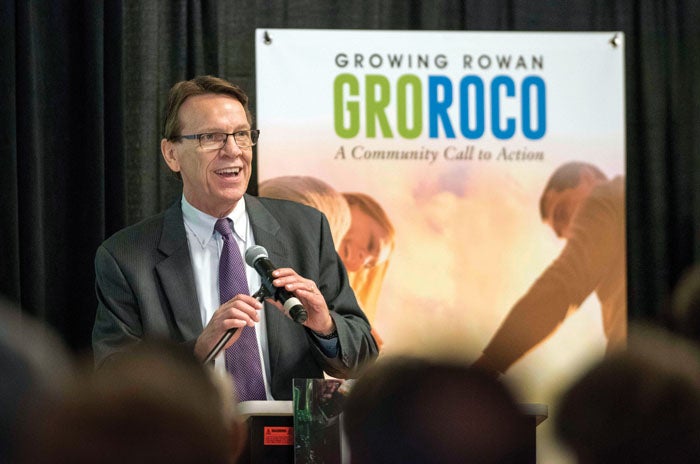Growing Rowan effort draws 200 attendees, aims to find creative solutions to future problems
Published 12:10 am Saturday, June 24, 2017

- Rod Crider, the new president of RowanWORKS Economic Development, was one of the three speakers at the kickoff of Growing Rowan in June 2017. Jon C. Lakey/Salisbury Post
SALISBURY — With the help of about 200 participants, local leaders on Friday kicked off a project that aims to leverage Rowan County’s assets in new and innovative ways.
County commissioners Chairman Greg Edds, who developed the project, likens the goal to cooking a better meal with the same ingredients.
Known as Growing Rowan, the project involves subgroups of local residents working to find solutions to problems in eight focus areas. Those areas are: branding, business climate, workforce development, entrepreneurship, industry clusters, education and next-generation philanthropy.
Friday’s gathering featured three speakers and the signing of a document known as the Rowan County Declaration of Interdependence.
“Everyone in this community knows that we could and should be doing better,” Edds said after Friday’s meeting. “It’s not like we’re sitting here with no assets. We know that we’re underperforming. So we’re trying to figure out how we use those assets to their full potential.”
He said the framework of Growing Rowan provides an opportunity that local residents have been craving to contribute constructively to improving the community.
Before participants split up into their subgroups, they heard speeches from Donnie Charleston, economic policy director at the Institute for Emerging Issues; Steve Chandler, the owner of branding firm Chandler Thinks; and Rod Crider, president of RowanWORKS Economic Development.
Charleston’s speech focused on the effect of technology on jobs and how demographics are changing in North Carolina and Rowan County.
He said technological advances will “fundamentally alter our economy.” He cited self-checkout lanes at stores such as Walmart as one example of how technology is disrupting the job market for cashiers.
Manufacturing jobs in North Carolina have declined sharply since the Great Recession, but the decline started decades ago, Charleston said. He said North Carolina lost roughly 540,000 jobs as a result of the Great Recession but stands to lose 2.4 million in coming years as a result of technological advances.
Charleston listed food service worker, retail salesperson, technical writer, truck driver, real estate agent and receptionist as occupations that could see declines in the number of available jobs as a result of new technology.
On demographics, Charleston said the number of white residents of Rowan County dropped after the recession, the Hispanic population increased significantly in recent years and the African-American population also increased, which is dissimilar to the national trend.
Chandler spoke next. He focused on the importance of the role that local residents play in their community’s image. He used a hotel clerk as an example of a local resident whose opinion on local matters could be important to visitors.
Chandler said it’s the job of every resident of Rowan County to improve the area’s reputation. Promoting the county requires residents to enjoy living in their community, he said.
Crider wrapped up the list of three speakers. He spoke about assets in Rowan County that should generate optimism about the area’s future. Being connected to Charlotte via Interstate 85 is one example.
“One of the things any community needs is to be connected to a metropolitan area,” he said.
Without such a connection, Crider said, there is doubt that a community will be able to grow its economy. And location weighs heavily on businesses’ decisions to expand or relocate, he said.
Rowan County faces challenges — such as the ones Charleston spoke about — but they are not insurmountable, Crider said.
“I’m not dismissing them, but I think we can overcome those,” he said.
He said Rowan County needs a vision to be successful and it appears that vision exists among local leaders.
Crider ended with a quote from Vince Lombardi, one of the most successful professional football coaches ever.
“Gentlemen, we are going to relentlessly chase perfection, knowing full well we will not catch it, because nothing is perfect. But we are going to relentlessly chase it, because in the process we will catch excellence,” Crider said, quoting Lombardi. “I am not remotely interested in just being good.”
As Crider wrapped up, Edds described the Declaration of Interdependence, which outlines a set of principles for elected officials. Edds and commissioners Vice Chairman Jim Greene have obtained support for the document from all municipalities in the county. On Friday, representatives of Rowan County cities and towns signed an enlarged version of the document.
The meeting wrapped up when participants split into eight subgroups, which will hold their own subsequent meetings. Participation in the subgroups requires members to meet for one hour per month, said Craig Lamb, vice president of continuing education at Rowan-Cabarrus Community College.
Lamb told the crowd that subgroups of Growing Rowan will be unlike other civic meetings where “we move little stickers around, we pat ourself on the back and go home.”
“We’re not putting stickers on posters today. We’re about action,” Lamb said.
Another large gathering like the one Friday may be held in the future, Edds said.
For more information about Growing Rowan, visit GrowingRowan.com.
Contact reporter Josh Bergeron at 704-797-4246.


